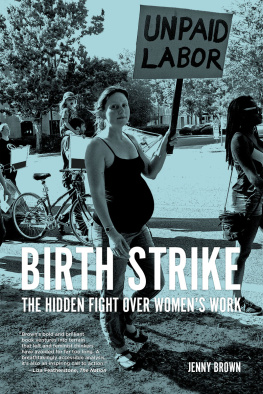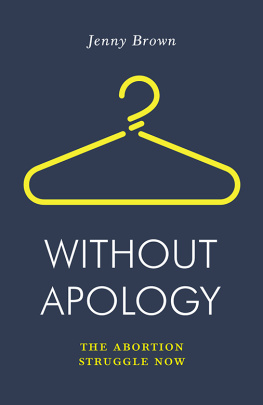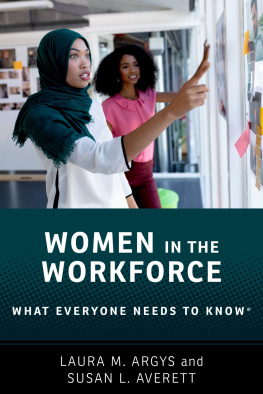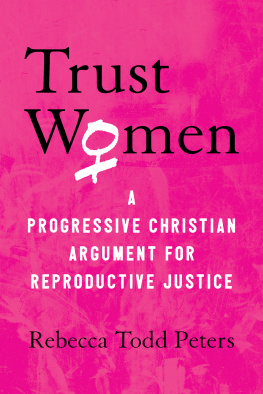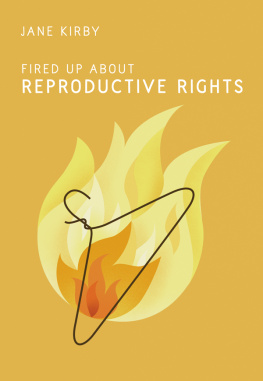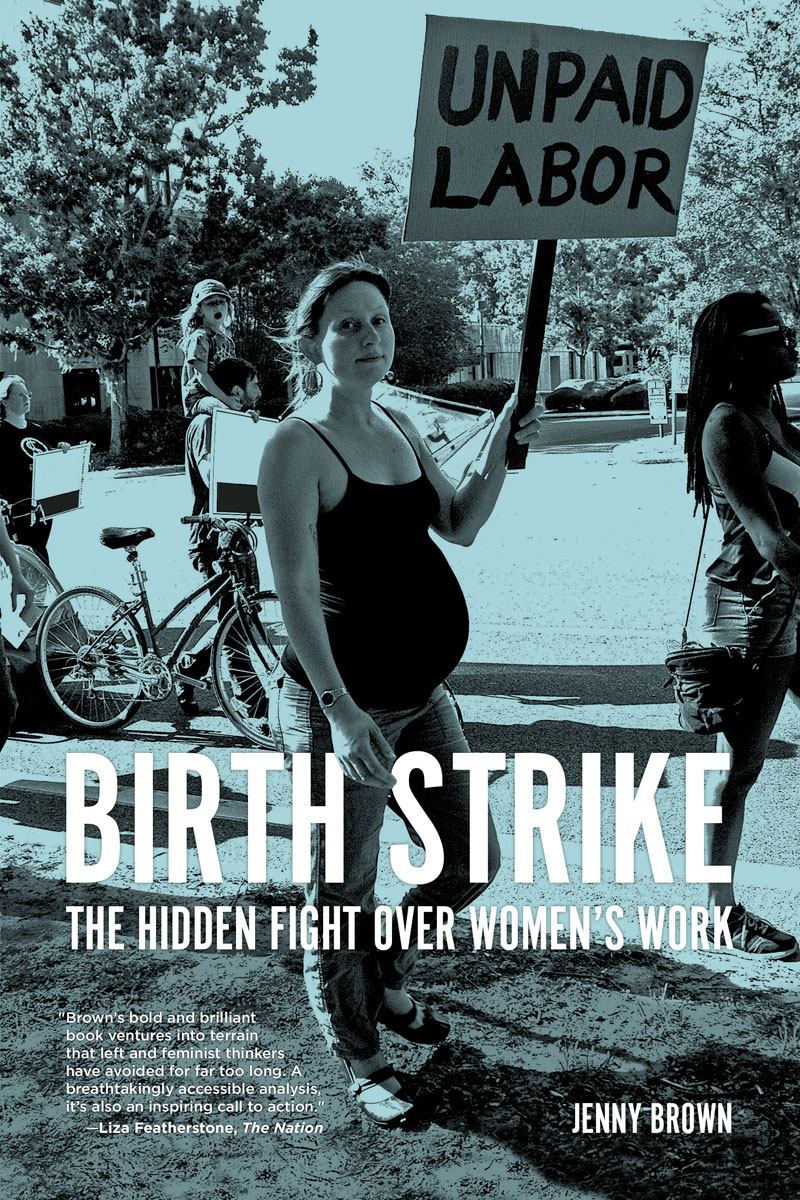
Jenny Brown compellingly explains the low U.S. birth rate: those primarily responsible for the labor of bearing and raising children (women) are responding as one should to lousy working conditionsby going on strike! Browns bold and brilliant book ventures into terrain that left and feminist thinkers have avoided for far too long. A breathtakingly accessible analysis, supported by riveting and intimate testimonials, its also an inspiring call to action.
Liza Featherstone, The Nation
Birth Strike is a well-researched and wide-ranging analysis of how the public responsibilities of pregnancy and parenting have been privatized to benefit a capitalist for-profit system designed to minimize labor costs to produce wealth for the few. Offers fresh insight into how womens biological power may be harnessed to resist reproductive oppression.
Loretta J. Ross, coauthor of Reproductive Justice
An audacious analysis of the falling U.S. birth rate, of the exploitive and often untenable conditions for raising children here and now, and of what might be done to change things. Feminist insight illuminates every chapter of this thoughtful book.
Alix Kates Shulman, author of Memoirs of an ExProm Queen and A Marriage Agreement and Other Essays: Four Decades of Feminist Writing
An astute analysis of power relations not only in the sphere of reproduction but also in the worlds of work, immigration, and government policy as they bear on womens ability to control their bodies. Brown lays bare why U.S. women who want to be mothers, and those who dont, have it far worse here than in Europe. Then she tells us how to change that.
Jane Slaughter, Labor Notes
A few years ago, statisticians discovered that the birth rate in the U.S. had hit an all-time low. In her provocative book Birth Strike Brown jumps off from this evidence to discuss the history of birth control and right to secure a legal abortion in the face of the ruling class of men who traditionally have dictated the rules of womens reproductive labor. This book is worth reading.
Susan Brownmiller, author of In Our Time: Memoir of a Revolution
This book lays bare how U.S. politics around race and immigration are closely connected to the struggle for reproductive freedom, both in the past and today. You will never think about reproductive rights in the same way again.
Ibram X. Kendi, author of Stamped from the Beginning
Jenny Brown reveals to us how and why reactionary ruling interests in the United States support heavy birth rates and oppose both abortion and birth control. Also given is a good report of various other countries and their prevailing interests. In all, an excellent read!
Michael Parenti, author of Democracy for the Few
Why are we still struggling for childcare and paid leave in the U.S.? Basic rights to birth control and abortion? In Birth Strike, Jenny Brown exposes the economic interests at play and shows the mighty power of women to change the game.
Lise Vogel, author of Marxism and the Oppression of Women
Birth Strike is an important contribution to the subject of women and our reproductive rights. Unlike much of the literature on contraception and abortion, Jenny Brown situates her analysis within the larger economic context of both labor and human rights.
Ti-Grace Atkinson, author of Amazon Odyssey and founder of The Feminists
Jenny Browns book Birth Strike is a game-changer and is equal in significance to Bettys FriedansFeminine Mystique in the 1960s, which sparked a movement.
Carol Downer, Feminist Womens Health Centers cofounder
Jenny Brown provides a compelling case that the battle over abortion and birth control is not just a religious or cultural difference of opinion. Rather, within these battles are deeper debates over the control of human labor. Filled with fascinating history and contemporary analysis, this book illuminates how womens liberation is in fundamental conflict with capitalism. Read this book to learn how women must take their political struggle beyond what are often narrowly misunderstood as womens issues.
Stephanie Luce, professor of labor studies, City University of New York, author of Labor Movements: Global Perspectives
Birth Strike: The Hidden Fight over Womens Work
Jenny Brown
2019 PM Press.
All rights reserved. No part of this book may be transmitted by any means without permission in writing from the publisher.
ISBN: 9781629636382
Library of Congress Control Number: 2018948918
Cover by John Yates / www.stealworks.com
Interior design by briandesign
10 9 8 7 6 5 4 3 2 1
PM Press
PO Box 23912
Oakland, CA 94623
www.pmpress.org
Printed in the USA by the Employee Owners of Thomson-Shore in Dexter, Michigan.
www.thomsonshore.com
To the next generation:
Alex, Amelia, Andre, Eli, Eliza, Ella, Enzo, Isaac, Kieran, Malcolm, Max, Milo, Reina, Robin, Rory, Sadie, Sarah, Simone, and Zoey
CONTENTS
| Global baby bust highlights necessity of reproductive workin the United States, birth rates hit record lowabortion is under attack but also contraceptionfeminists give various explanations why birth control is targeted, but low birth rate is not among themlessons from the morning-after pill strugglea note on the power structure |
| Birth rate debate is overt in other countrieslow birth rates are seen as threat to economiesJapan, China, Russia, Turkey, Germany, France, and Sweden change policies in response to birth slowdownspaid family leave, child allowances, and childcare contrast to U.S. case |
| Costs of parenthood, from childcare to college, are pushed onto the familypro-family rhetoric means family instead of government, putting unpaid work on womenrather than assistance, parents face enforcementwage stagnation means both parents must work for pay, squeezing the family care job into time after work |
| Women tell it like it is about motherhood in the United States and analyze their decisions to have or not have childrenmany stop at onetestimony suggests that women are on an informal, uncoordinated birth strike in response to bad reproductive working conditions |
| Comstock Law outlaws abortion and contraception in 1873abortion made illegal because married women are shirking their duty to have babieslaw the culmination of a campaign to impose reproductive control on womenfeminist campaign for birth control loosens laws by 1930sComstock not fully overcome until feminisms second wave |
| Baby booms cause establishment panic about overpopulation, though they still regulate abortionpanic confuses feminists, do the powerful want us to have babies or not?population panic subsides with falling birth rates by the mid-1970sfeminists still suspect they want to restrict births, especially among the unemployed, low-waged, and people of color |
| Social Security has pooled the risk of having children, freeing womenpoliticians complaints that an aging population cannot be supported are a ruseproductivity has risen but workers havent benefittedcuts to Social Security force older workers onto the labor market and make retirees dependent on their children |
Next page
